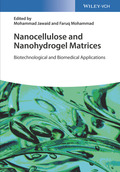Nanocellulose and Nanohydrogel Matrices
Biotechnological and Biomedical Applications

1. Edition July 2017
XX, 362 Pages, Hardcover
91 Pictures (45 Colored Figures)
Handbook/Reference Book
Short Description
This first book on nanohydrogels for biomedical applications is unique in discussing recent advancements in the field, resulting in a comprehensive, well-structured overview of nanocomposite and nanohydrogel materials.
This first book on nanocellulose and nanohydrogels for biomedical applications is unique in discussing recent advancements in the field, resulting in a comprehensive, well-structured overview of nanocellulose and nanohydrogel materials based nanocomposites.
The book covers different types of nanocellulose materials and their recent developments in the drug delivery and nanomedicine sector, along with synthesis, characterization, as well as applications in the biotechnological and biomedical fields. The book also covers the current status and future perspectives of bacterial cellulose and polyester hydrogel matrices, their preparation, characterization, and tissue engineering applications of water soluble hydrogel matrices obtained from biodegradable sources. In addition, the chitosan-based hydrogel and nanogel matrices, their involvement in the current biofabrication technologies, and influencing factors towards the biomedical sector of biosensors, biopharmaceuticals, tissue engineering appliances, implant materials, diagnostic probes and surgical aids are very well documented. Further, the history of cellulose-based and conducting polymer-based nanohydrogels, their classification, synthesis methods and applicability to different sectors, the challenges associated with their use, recent advances on the inhibitors of apoptosis proteins are also included. The recent developments and applications in the drug delivery sector gives an overview of facts about the nanofibrillated cellulose and copoly(amino acid) hydrogel matrices in the biotechnology and biomedicine field. This book serves as an essential reference for researchers and academics in chemistry, pharmacy, microbiology, materials science and biomedical engineering.
Toxicity Resistance of Nanocelluloses and Nanohydrogels towards Biomedicine
Biochemical and Molecular Effects of Nanocelluloses and Nanohydrogels for Advanced Biotechnology and Biomedicine
Antibacterial, Antimicrobial and Antiviral activity of Nanocellulose and Nanohydrogels for Wound Dressing Applications
Chitosan-Mediated Fabrication of Devices by Layer-by-Layer Assembly and Their Biomedical Applications
Gene-Based Delivery of Natural Chemotherapeutic Drugs by Hydrogel Polymers
Nanocellulose from Natural Fibres for Tissue Engineering
Recent Developments towards Drug Delivery and Wound Healing by Nanocelluloses
Recent Advances in Nanocelluloses for Biomedical Applications
Bacterial Nanocellulose Hydrogel as an Implant Material for Auricular Cartilage Regeneration
Nanocellulose: Properties, Applications and Future Trends for Their Uses in the Biotechnology Sector
Nanohydrogel-Based Stimuli-Responsive Nanosystems for Bioengineering Applications
Nanogels as Photo-Responsive Materials for Multifunctional Bio-Related Applications
Nanohydrogels for Delivering Macromolecular Therapeutics
Progress in the Application of Intelligent Nanohydrogels in Pharmacy
Faruq Mohammad is currently working as an assistant professor at the Surfactant Research Chair, Department of Chemistry, College of Science, King Saud University in Kingdom of Saudi Arabia since March 2016. His Post-Doctoral Research experiences are from Institute of Advanced Technology, Universiti Putra Malaysia (Malaysia), School of Pharmacy, North-West University (Republic of South Africa), and Health Research Center, Southern University and A&M College (USA). He obtained his Ph.D. from the department of Environmental Toxicology, Southern University and A&M College, USA, in May 2011. His present research interests include biosensors, polymeric nano drug delivery systems, nanomaterials toxicity, hyperthermia-based cancer therapy, as well as biomaterials for sustainability and catalysis.


